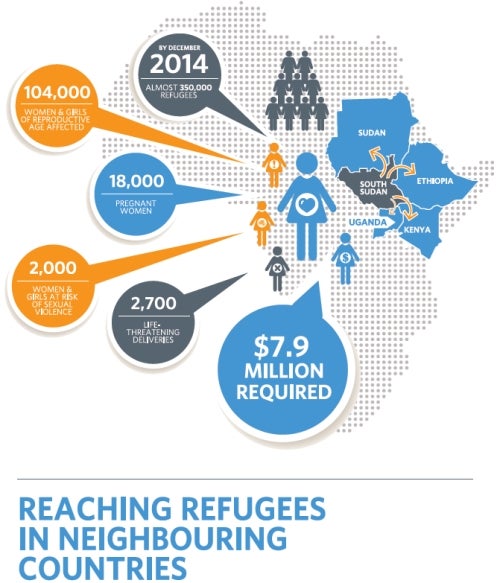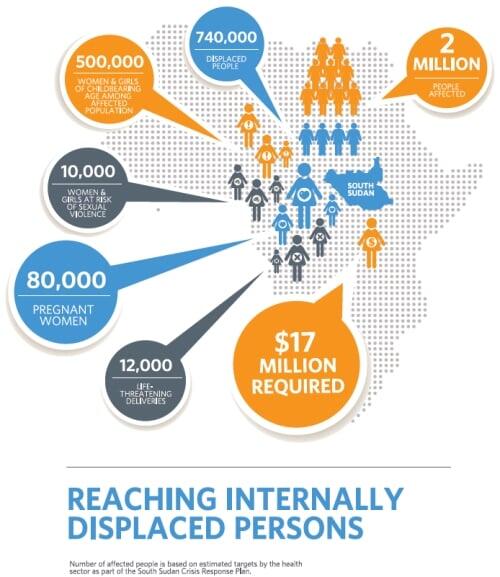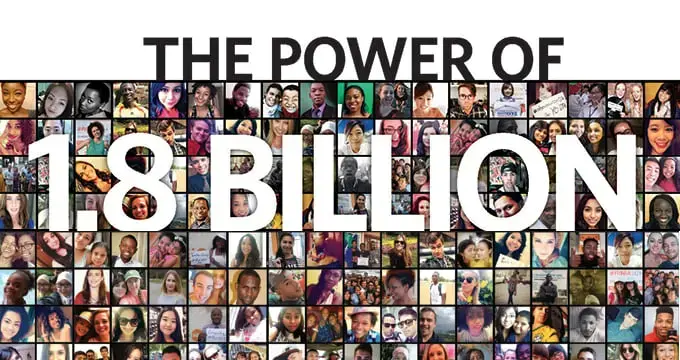Read full urgent appeal
Read Mary Akuol's story
In December 2013, violence broke out in South Sudan’s capital, Juba, and spread quickly around the country. The conflict has so far displaced 740,000 people, the vast majority of them in four states.
What is the impact on maternal/reproductive health?
It is estimated that the crisis has directly affected about 2 million people, among them half a million women and girls of reproductive age (15-49 years). Hundreds of thousands of people have lost their livelihoods and access to basic services. Over 80,000 people have sought protection at UN bases in the seven affected states.
South Sudan has one of the highest maternal mortality ratios in the world - 2,054 deaths per 100,000 live births. Pregnant women, who are cut off from basic services and healthcare, are therefore particularly vulnerable in this conflict situation. Prior to the crisis, the country’s fertility rate was nearly 7 children per woman. UNFPA therefore estimates that 80,000 pregnant women living in affected areas (and thus 2,800 births every month) will require care by the end of December 2014. A more detailed breakdown is as follows:
- An estimated 12,000 women will likely experience complications and require care.
- About 4,000 births are likely to require emergency Caesarean sections. Without adequate care, this number could increase considerably.
What is the impact on gender-based violence?
Gender-based violence (GBV), including rape, sexual harassment, intimate partner violence and early marriage, were already widespread in South Sudan before thet crisis. This number is likely to increase – due to high insecurity and the loss of community protection mechanisms as a result of the conflict.

If adequate protection measures are not put in place - including ccommunity-based protection networks, provision of women-friendly/safe spaces, and dignity kits with protective items (whistles and torches) - in the current context an estimated 10,000 women and girls could be at risk of sexual violence.
Reaching refugees in neighbouring countries
The conflict in South Sudan has resulted in nearly 194,000 people seeking asylum in neighbouring countries, in particular Uganda, Ethiopia, Kenya and Sudan. Aid agencies estimate that the ongoing crisis in South Sudan could result in 350,000 people seeking refuge outside of the country by December 2014. Over 80 per cent of the refugee population from South Sudan consists of women and children.
Existing health facilities in host communities and established camps are currently overstretched. There is an urgent need to strengthen the preparedness of the delivery systems, ensure the availability of basic health care (including reproductive health and mental health through psycho-social support), and strengthen detection of and response to disease outbreaks.
UNFPA targets women and youths
The main target groups for this appeal for funding are women of reproductive age, including pregnant women, and adolescent girls and boys who have been internally displaced as a result of the violent conflict. An estimated $25million is required to provide adequate reproductive health services and to help prevent and respond to gender-based violence.
Read the full urgent appeal for funding
Read Mary Akuol's story




